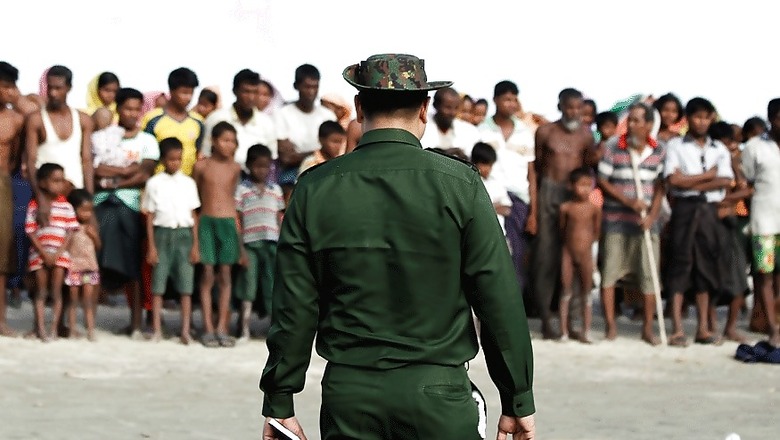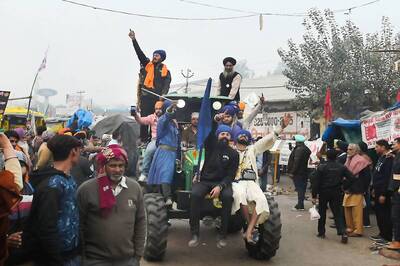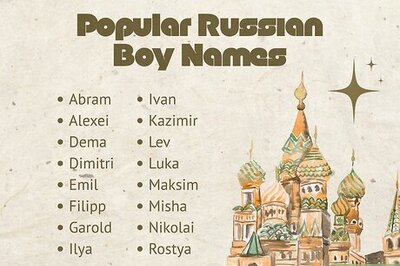
views
Naypitw: Myanmar and Bangladesh signed an accord on Thursday over terms for the return of hundreds of thousands of Rohingya Muslims who have fled to Bangladesh, a government official said, amid concern that Myanmar's powerful army could prove obstructive.
Rights groups have accused the military in mostly Buddhist Myanmar of carrying out mass rape and other atrocities during a counter-insurgency operation launched in late August in retaliation for attacks by Rohingya militants in Rakhine State.
On Wednesday, the United States said the military operation that drove 620,000 Rohingya to seek sanctuary in neighbouring, largely Muslim Bangladesh, amounted to "ethnic cleansing", echoing an accusation first levelled by top U.N. officials in the early days of the humanitarian crisis.
Myanmar is seeking to ease international pressure by striking an initial agreement on returns, while Dhaka wants to ensure overstretched refugee camps that have mushroomed in the Cox's Bazar region don't become permanent.
"We are ready to take them back as soon as possible after Bangladesh sends the forms back to us," Myint Kyaing, a permanent secretary at Myanmar's ministry of labour, immigration and population, told Reuters, referring to forms the Rohingya must complete with personal details before repatriation.
The signing took place after a meeting between Myanmar's civilian leader Aung San Suu Kyi and Bangladesh foreign minister Abul Hassan Mahmood Ali in Naypyitaw.
Myint Kyaing said that the memorandum of understanding was based on the 1992-1993 repatriation agreement between the two countries which had been inked following a previous spasm of violence in Myanmar.
The forms that the refugees will have to fill include names of family members, their previous address in Myanmar, date of birth and a disclaimer that they are returning voluntarily, said Myint Kyaing.
He said that based on the 1992-1993 agreement, Myanmar would accept those who could present identification documents issued to the Rohingya by Myanmar governments in the past. Those include the currently distributed national verification cards, as well as now-withdrawn "white cards", as well a s receipts the Rohingya received when returning their "white cards", he said.
Diplomats and aid workers have said the key elements of the deal will be the criteria of return and the participation of the international community, such as the United Nations refugee agency, in the process.
Other important points include safeguards for the Rohingya against further violence, a path to resolving their legal status and whether they would be allowed to return to their own homes and farms.
Myint Kyaing declined to elaborate on those points.
Speaking at a military event in Dhaka, Bangladesh Prime Minister Sheikh Hasina said she was calling on Myanmar "to start taking back soon their nationals from Bangladesh.”
'HORRENDOUS ATROCITIES'
Suu Kyi, whose reputation as a Nobel peace prize winner has suffered during the crisis, has said repatriation of the largely stateless Muslim minority would be based on residency and that it will be "safe and voluntary".
But her less than two-year-old civilian administration has to share power with the military who ruled the country for decades, and Myanmar's generals have appeared less enthusiastic about the prospect of Rohingya returning.
In a warning to Myanmar's military, the U.S. Secretary of State Rex Tillerson raised the threat of targeted sanctions against those responsible for what he called "horrendous atrocities" in a statement on Wednesday.
Russia's ambassador to Myanmar criticised the U.S. stance, saying that using the term "ethnic cleansing" was unhelpful and could aggravate the situation.
Myanmar's commander in chief, Senior General Min Aung Hlaing was in Beijing on Wednesday, where a senior Chinese general told him that China wants stronger ties with Myanmar's military.
Humanitarian workers told Reuters they were particularly concerned about a statement made by Min Aung Hlaing after his meeting with Tillerson last week.
"The situation must be acceptable for both local Rakhine ethnic people and Bengalis, and emphasis must be placed on wish of local Rakhine ethnic people who are real Myanmar citizens," Min Aung Hlaing said.
His use of the term Bengali for the Rohingya implies they are from Bangladesh, and Buddhists in Rakhine are largely opposed to their presence.
Min Aung Hlaing, over whom Suu Kyi has no control, also said the returnees will be "scrutinized and re-accepted under the 1982 Citizenship Law and the 1992 Myanmar-Bangladesh bilateral agreement".
The 1982 law, passed during the junta's long rule, ties Myanmar citizenship to membership of recognised ethnic groups, an official list that excludes the Rohingya.
Senior U.N. officials based in Myanmar told Reuters that they feared that security personnel in key positions may not cooperate with the return of Rohingya.


















Comments
0 comment